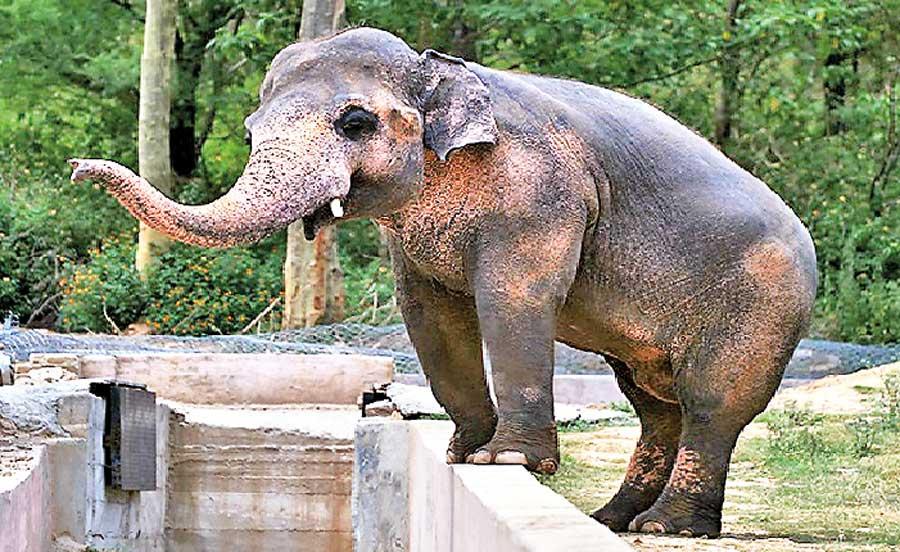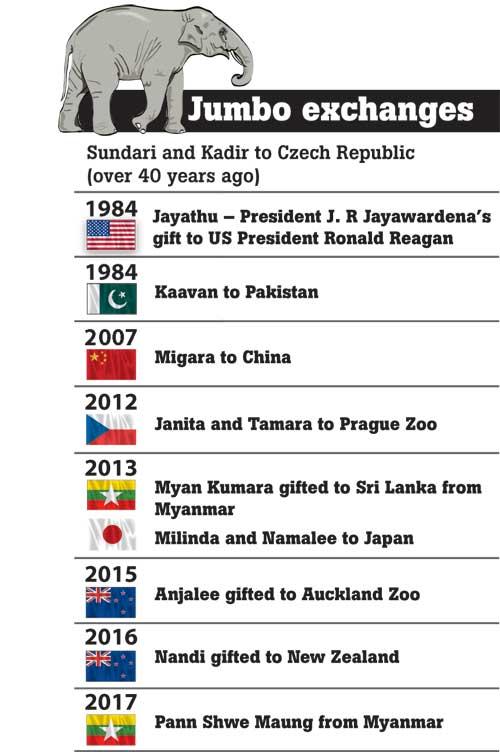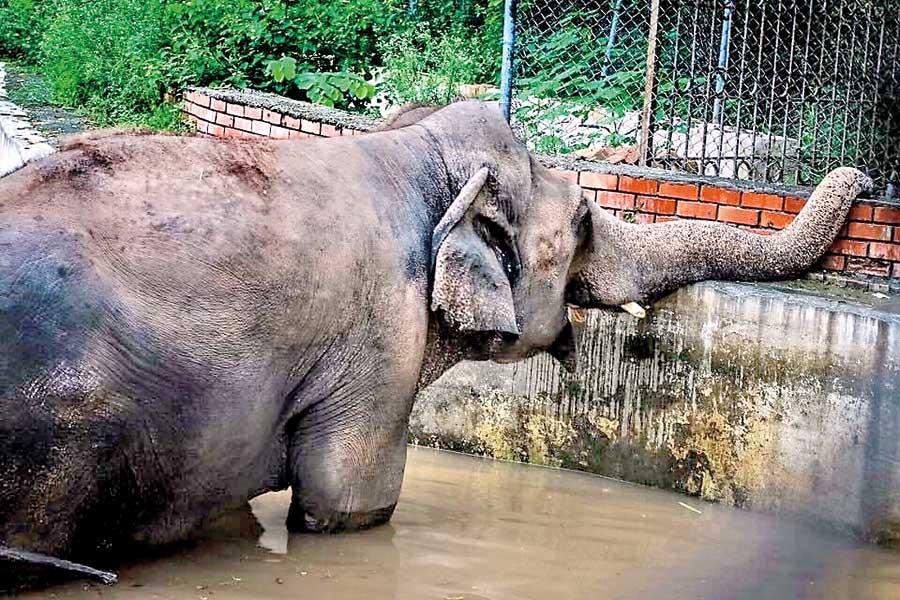Reply To:
Name - Reply Comment
Last Updated : 2024-04-25 14:54:00

This photograph taken on June 30, 2016, shows Pakistani elephant Kaavan next to a moat at the Marghazar Zoo in Islamabad. (AFP)
Time is ticking as Kaavan, the Asian bull elephant who went through years of torture at the Marghazar Zoo, Islamabad needs to be re-homed at a ‘suitable sanctuary’ within 30 days. The historic ruling was issued by the Islamabad High court on May 21 after a continuous four-year campaign led by US music icon and animal rights activist Cher. 
Apart from her, several other local and international animal rights groups too have voiced against the inhumane treatment experienced by the elephant during his lifetime within a small enclosure. Successive regimes have had the practice of gifting elephants to other countries as means of strengthening diplomatic relations but animal welfare groups claim that it is not only an outdated practice but unethical as well.
"Over the years, Kaavan was acknowledged as Pakistan’s loneliest elephant. However, US singing sensation Cher had continuously fought for his release after she saw the elephant living alone and was held miserably in chains in a small enclosure. After a four year campaign, on May 21, the Islamabad court ruled that Kaavan should be moved to a ‘suitable sanctuary’ within 30 days after consulting with Sri Lankan authorities."
However, the same interest groups suggest that Kaavan the elephant now needs a safe environment where he should be free all the time, devoid of chains and require continuous care. But, whether Sri Lanka has facilities or is ready to provide him with such personalised care for the rest of his life are immediate concerns.
The life of ‘Pakistan’s loneliest elephant’
Back in 1985, Kaavan was captured, taken away from his herd and was gifted to former President of Pakistan Zia-ul-Haq to be displayed at the Islamabad Zoo.
|
Tweet by US singer Cher upon hearing the release of Kaavan |
At the time he was a one-year-old baby. Chained and isolated, Kaavan had been spending a lonely life since 2012 after his partner Saheli passed away as a result of chronic neglect. However, the Zoo continued to hold onto Kaavan despite protests from local and international animal rights campaigners.
Petitions were signed requesting the Pakistani Prime Minister Nawaz Shariff to move Kaavan to a sanctuary but although several state senators agreed to it, the government held on to the decision as Kaavan attracted visitors and was a money-spinner to the Zoo.
Over the years, Kaavan was acknowledged as Pakistan’s loneliest elephant. However, US singing sensation Cher had continuously fought for his release after she saw the elephant living alone and was held miserably in chains in a small enclosure. Thereafter she kept pushing the Islamabad Zoo to better Kaavan’s living conditions.
As a leading wildlife charity in the world, the Born Free Foundation, UK opposes the exploitation of wild animals in captivity and campaigns to keep them in the wild. One of their nine working priorities is Rescue, Care, Rehab and Release where they have been involved in the rescue and rehabilitation of countless wild animals, saving them from a life of suffering in captivity. Hence, in an exclusive conversation with the Daily Mirror, Born Free Foundation’s Head of Animal Welfare and Captivity Dr Chris Draper explained why bringing down Kaavan to Sri Lanka may not be the
best option.
Q : Now that Kaavan is released, what is the next step in the rescue and care process?
The point to note is that Kaavan needs much better care now. Sri Lanka doesn’t have a genuine elephant sanctuary. Therefore, anywhere he goes in Sri Lanka will not offer an excellent service. But there are two options to consider: one is to establish a genuine elephant sanctuary in Karachi itself and move all elephants there. The other is to consider moving Kaavan to a place where there is a genuine elephant sanctuary such as in the US.
We appreciate that Kaavan was born in SL but if he does come to Sri Lanka the authorities need to ensure that he’s never chained. He has gone through a lifetime of restrictions already. He should live in a facility where he’s free all the time and have the company of other elephants as well. Apart from that proper veterinary care and nutrition need to be looked into. It’s highly unlikely that he’s going to the wild since he was interacting with humans for the greater part of his life.
Q : What are your recommendations in setting up a rescue and care facility in Sri Lanka, especially one that focuses on rehabilitating elephants?
There are a range of facilities including one that provides care for young, orphaned elephants and calves. But this may not be possible with an older elephant like Kaavan. Then there is a zoo, safari park and places like Pinnawala. But all of these facilities should improve in terms of providing care and other facilities. But this is not to say that these facilities are beyond hope but there has been a resistance to change.
Q : Born Free rescued four lions from Paris and were re-homed at the big sanctuary in Shamwari. How  long did they take to adapt to the surroundings?
long did they take to adapt to the surroundings?
They were surrendered when they were young and once rescued, they were put into large natural enclosures. It took several months for them to adapt to the new environment. At first, they were curious and apprehensive until they fully acclimatised.
Q : What are the indicators (eg: behaviour, relationship with other animals etc) to find out if the re-homed animals are adapting well to the new environment?
Depends on the species. In the case of cats, they will come out of hiding, appear near the fence line and you would observe a decline in fear. They will try to explore and interact. Sometimes you will see a playful side emerging. Playing allows them to interact better with their surroundings. In fact, it is a gradual relaxation. For elephants, it’s different because they’re social animals.
Q : Kaavan was held captive in a country that had no Asian elephants. What are some likely challenges that the Sri Lankan authorities could experience once it is being brought down?
Logistics is going to present the biggest challenge. It’s a big undertaking. Travelling could agitate the animal. It’s important to have proper crate training and ensure that the animal is comfortable on all four sides. It’s best if it could travel by road and a shorter distance. Other options are to airlift him in a large military aircraft or by sea, but the logistics should be carried out legally.
Q : Sri Lanka has had the practice of gifting baby elephants to strengthen diplomatic ties. What concerns do you have?
Sri Lanka’s practice of gifting elephants to other countries must come to an end. It’s a misguided and outdated approach altogether. As a result animals leave their natural homelands and there’s no benefit for the elephant. It’s breaking up social bonds, they undergo a lot of stress during cross country transportation and thereafter goes through a lifetime of restriction and harassment. Therefore the Sri Lankan and Pakistani authorities should work together and find an optimal solution to release Kaavan and rest of the elephants held
in captivity.
“We don’t know how it was looked after in Pakistan and according to the literature I have read, we will not be able to release it to the wild,” opined Dr S. Wijeyamohan of the Faculty of Applied Sciences of the Jaffna University’s Vavuniya Campus, who had studied on physical conditions of captive elephants for a long time.
“If it has been with elephants then there’s a possibility that it would go towards human settlements. We don’t know the kind of food it fed on and the protocols that were followed in that country,” Dr Wijeyamohan said.
“We need to check if it has any disease such as Herpes. In that case, it has to go through quarantine. If it is brought down to Sri Lanka, it may have to be looked after in isolation,” he said.
When asked about Sri Lanka’s progress in captive elephant care, Dr Wijeyamohan said that there’s room for improvement.
“Captive elephants still can walk around and have better conditions than in some Western countries. But we are not the best. The problem is that people are reluctant to change,” he said.
DWC awaiting directions
When inquired about Kaavan’s release, Wildlife Department Director-General M. G. C. Sooriyabandara said that they had received the communication. “To bring him down a CITES permit has to be issued. However, we have not been informed about our responsibilities as yet. That has to be decided by the Wildlife Ministry.”
CITES (Convention on International Trade in Endangered Species also known as the Washington Convention) is a multilateral treaty to protect endangered plants and animals.
Several attempts to contact Wildlife and Sustainable Development Minister S. M. Chandrasena proved futile.
"CITES permits are issued for the species protected by CITES convention categories. Therefore, when export or import of Fauna and Flora species, permits are issued by the DWC as the governing body of the Flora and Fauna Protection Ordinance and the international CITES convention. The species covered by CITES are listed in three appendices, according to the degree of protection they need"
The Asian Elephant is listed in Appendix 1 of the CITES convention. CITES works by subjecting international trade in specimens of selected species to certain controls.
These require that all import, export, re-export (export of a specimen that was imported) and introduction from the sea of species covered by the Convention has been authorised through a licensing system.
CITES permits are issued for the species protected by CITES convention categories. Therefore, when export or import of Fauna and Flora species, permits are issued by the DWC as the governing body of the Flora and Fauna Protection Ordinance and the international CITES convention. The species covered by CITES are listed in three appendices, according to the degree of protection they need.
The three appendices include:
There are special rules in these cases and a permit or certificate will generally be required. Anyone planning to import or export/re-export specimens of a CITES species should contact the National CITES management authorities of the countries of import and export/re-export for information on the rules that apply.

Image courtesy: Free Kaavan the Elephant – FB Page
Nimal Gunatilleke Friday, 29 May 2020 06:00 PM
Very sad. Immediate transfer to .. Parliament or Sri Kotha?
Sara Friday, 29 May 2020 06:26 PM
This is so sad, just like the black leopard story...these poor animals don't deserve this treatment. How can people do this!
DD Sunday, 31 May 2020 03:22 AM
As lord Buddha preached all living beings have equal rights to live. Domination and discrimination from so called intelligent and educated humans have no mercy to animals. They normally say "They are animals", but they also should live though not intelligent like humans and cannot voice on their rights. Therefore, we human should voice, protect and let them live in their territories.

Add comment
Comments will be edited (grammar, spelling and slang) and authorized at the discretion of Daily Mirror online. The website also has the right not to publish selected comments.
Reply To:
Name - Reply Comment
US authorities are currently reviewing the manifest of every cargo aboard MV
On March 26, a couple arriving from Thailand was arrested with 88 live animal
According to villagers from Naula-Moragolla out of 105 families 80 can afford
Is the situation in Sri Lanka so grim that locals harbour hope that they coul